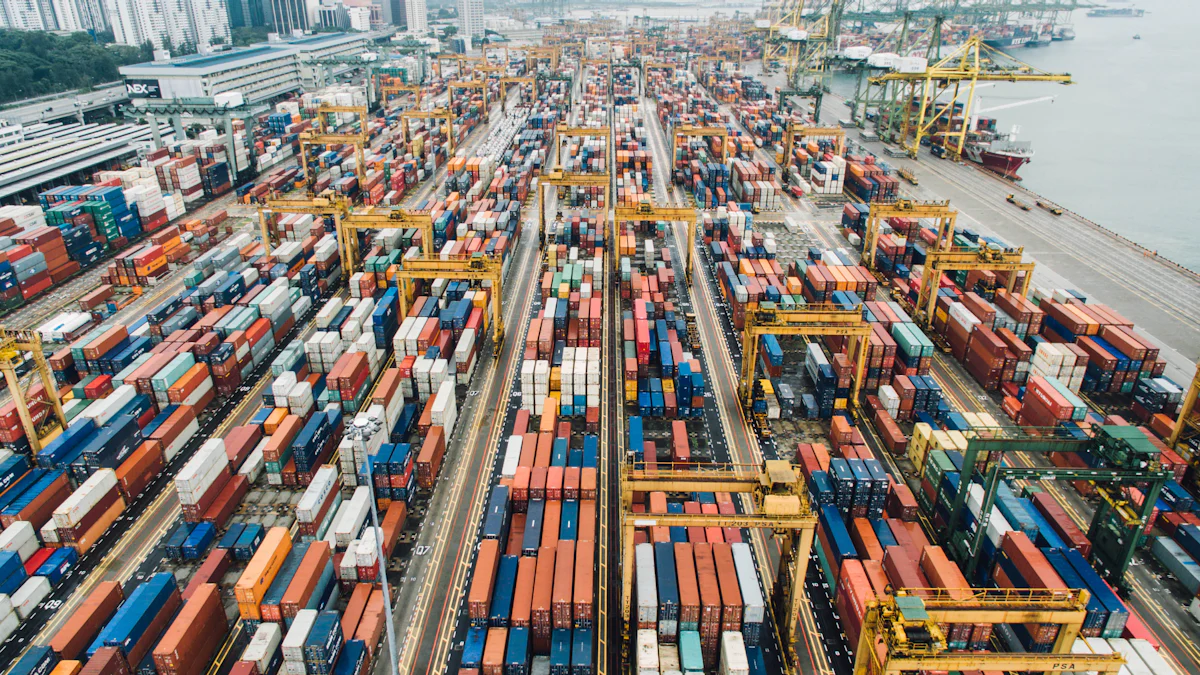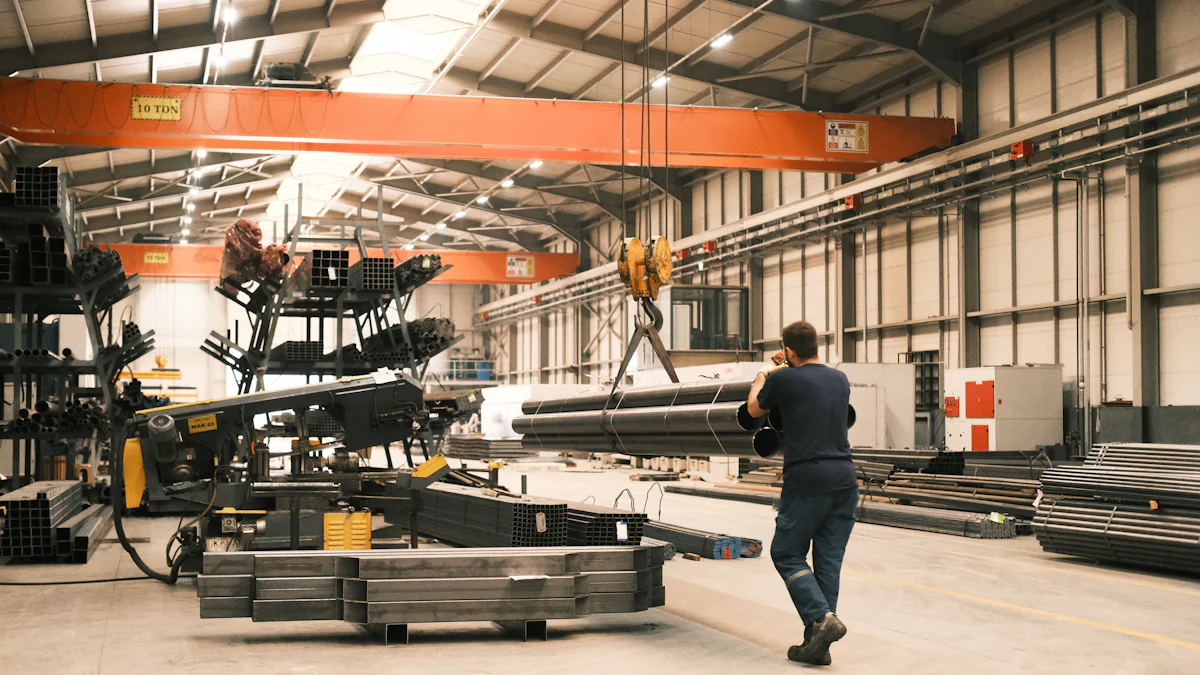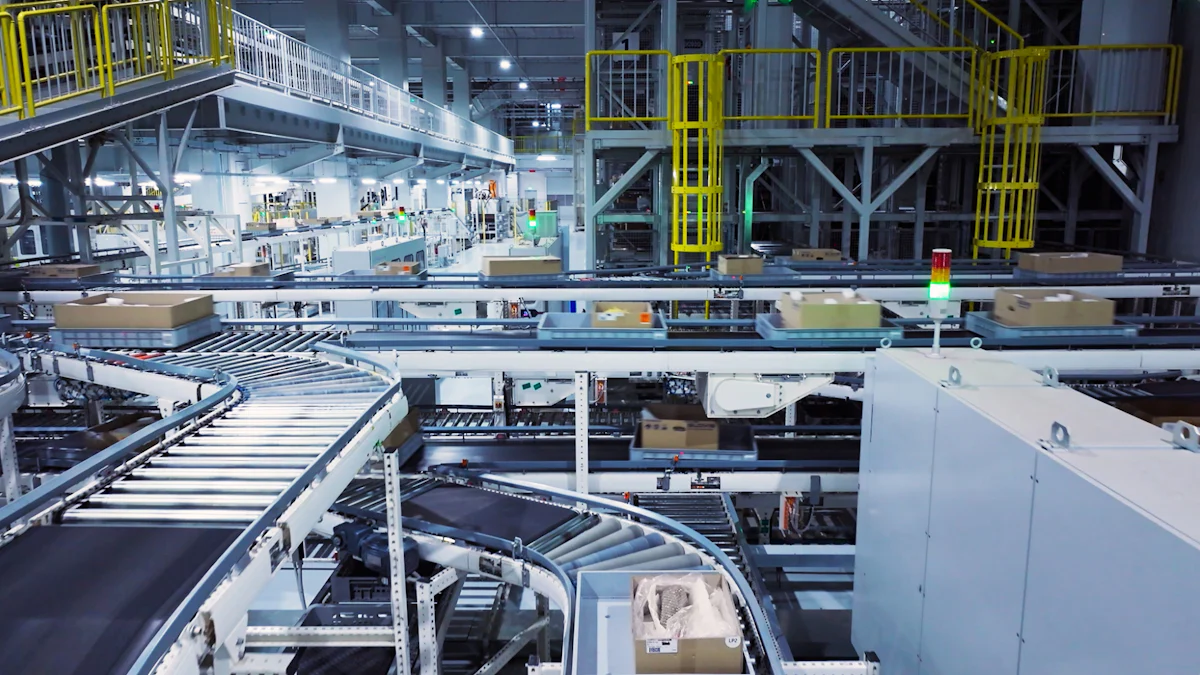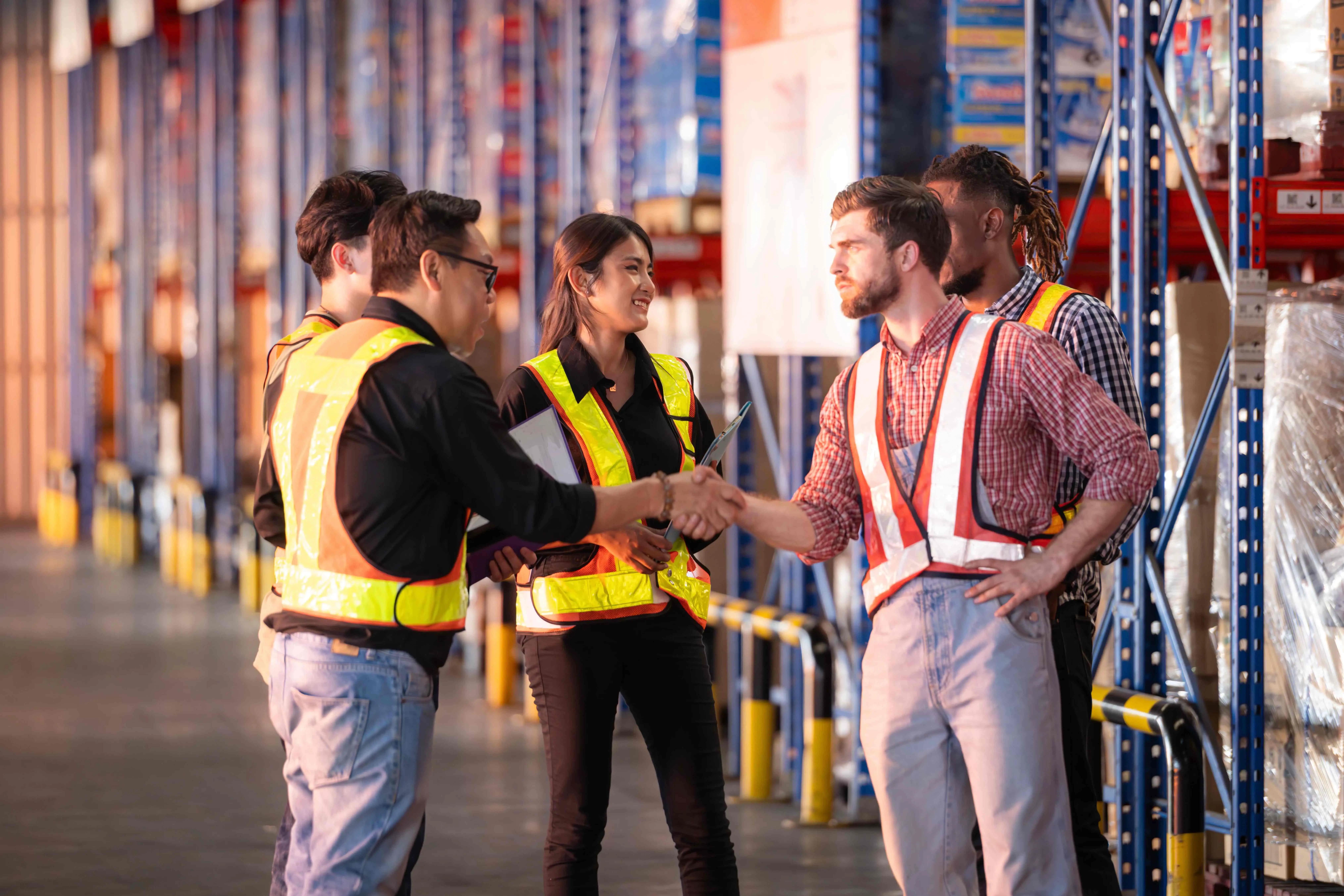Artificial Intelligence Transforming Logistics and Supply Chains in 2025

Artificial intelligence is revolutionizing the logistics industry, driving efficiency and innovation. By 2025, the AI in logistics market is expected to grow to $5.75 billion, with a CAGR of 42.6%. AI-powered tools already reduce costs by 15% and inventory levels by 35%. Solutions like JUSDA's platform enhance transparency, optimize operations, and improve decision-making.
Key Takeaways
AI helps predict demand better, cutting mistakes by 50%. This means products are available more often, and sales are not lost.
AI-powered robots in warehouses lower mistakes and save time. This makes moving goods faster and more efficient.
AI gives real-time tracking, showing where items are. It helps fix delays quickly and makes the supply chain more reliable.
The Current Role of Artificial Intelligence in Logistics
Demand Forecasting and Inventory Optimization
AI has transformed demand forecasting by analyzing historical data, market trends, and external factors. You can now predict demand trends with unmatched accuracy, reducing forecasting errors by up to 50%. This improvement minimizes lost sales and ensures product availability. AI-driven predictive analytics also help you adapt to unexpected disruptions, refining inventory levels and cutting costs. For example, dynamic inventory management powered by AI enables businesses to balance stock levels effectively, saving money and improving efficiency. McKinsey reports a 35% improvement in inventory levels through AI implementation, showcasing its impact on supply chain optimization.
Automation in Warehousing and Distribution
AI-driven automation has revolutionized warehousing. Advanced algorithms enhance operations like inventory management and order fulfillment. Technologies such as autonomous mobile robots (AMRs) and automated guided vehicles (AGVs) optimize pick routes and material transport. You can rely on AI to reduce downtime, improve equipment performance, and ensure real-time inventory management. Fully autonomous warehouses are emerging, where AI handles core processes, creating hyper-connected environments. These advancements not only speed up operations but also minimize human error, making logistics 4.0 a reality.
Real-Time Tracking and Visibility in Supply Chains
AI enables real-time tracking of shipments and vehicles, giving you complete visibility across the supply chain. Technologies like IoT sensors, GPS, and cloud computing provide accurate location data and condition monitoring. This transparency allows you to respond quickly to delays or issues, ensuring smooth operations. AI-powered platforms integrate these technologies into supply chain software, enhancing collaboration and decision-making. Real-time insights improve inventory management and reduce risks, making your logistics operations more reliable.
Route Optimization and Delivery Efficiency
AI optimizes delivery routes by analyzing traffic, weather, and other variables. Machine learning algorithms identify the most efficient paths, reducing fuel consumption and transportation costs. Companies like DHL use AI to enhance delivery times and lower expenses. By minimizing empty miles and maximizing vehicle utilization, AI increases delivery capacity without additional resources. This optimization improves customer experience and supports sustainable logistics practices, aligning with the goals of the modern logistics industry.
Key Benefits of AI in the Logistics Industry

Enhanced Operational Efficiency and Cost Reduction
AI transforms logistics operations by automating repetitive tasks and optimizing resource allocation. You can achieve significant cost savings across various areas. For example, AI reduces transportation costs by 22%, inventory holding costs by 30%, and manual labor costs by 35%.
Cost Category | Reduction Percentage |
|---|---|
Transportation Costs | 22% |
Inventory Holding Costs | 30% |
Manual Labor Costs | 35% |
These savings directly enhance operational efficiency, allowing you to allocate resources more effectively. AI-powered tools also streamline processes like route planning and warehouse automation, ensuring faster and more accurate operations. This efficiency positions your business to thrive in the competitive logistics industry.
Improved Decision-Making Through Predictive Analytics
AI-driven predictive analytics empowers you to make smarter decisions. It analyzes historical sales data and market trends to improve demand forecasting. This ensures you maintain optimal stock levels and avoid overstocking or stockouts. Predictive analytics also identifies potential supply chain disruptions, enabling you to plan contingencies proactively.
Enhances demand forecasting for accurate customer demand predictions.
Optimizes inventory management to reduce holding costs.
Identifies risks early, allowing for timely responses.
These capabilities improve supply chain optimization and help you stay ahead of challenges.
Better Customer Experience and Satisfaction
AI enhances customer satisfaction by improving transparency and responsiveness. Real-time tracking provides accurate ETAs, keeping customers informed. Automated notifications alert them to delays, while AI chatbots address queries promptly. Optimized delivery routes ensure faster shipments, exceeding customer expectations.
Real-time tracking reduces anxiety and builds trust.
Predictive issue resolution prevents problems before they occur.
Personalized communication through AI chatbots improves customer care.
These advancements create a seamless experience, fostering loyalty and trust in your services.
Sustainability and Resource Optimization
AI supports sustainable logistics practices by reducing waste and emissions. It optimizes transportation routes, cutting fuel consumption and minimizing environmental impact. Enhanced demand forecasting ensures efficient production, reducing excess inventory. AI also tracks materials to ensure compliance with sustainability regulations.
Optimizes routes to lower fuel usage and emissions.
Improves energy management through data-driven decisions.
Promotes green practices across the supply chain.
By adopting AI, you contribute to a greener future while improving operational efficiency.
Challenges of AI Adoption in Supply Chain Management
Complexity of System Integration and Scalability
Integrating AI into your supply chain can be challenging due to the complexity of existing systems. Legacy systems often lack compatibility with modern AI technologies, requiring costly and time-consuming updates. Functional silos within organizations further complicate data sharing, limiting AI's ability to deliver comprehensive insights. You may also face difficulties managing diverse data sources, which are essential for effective AI performance. Without a clear transformation strategy, aligning AI implementation with your business goals becomes difficult. To overcome these challenges, you need robust infrastructure and a well-defined roadmap that ensures scalability and seamless integration.
Ethical and Data Privacy Concerns
AI in logistics relies heavily on data, raising concerns about privacy and security. As you collect data from GPS tracking, customer interactions, and other sources, you must ensure compliance with regulations like GDPR. Transparency about how you gather and use data is crucial to building trust. Industry surveys reveal that 31% of professionals worry about data privacy, while 43% cite regulatory challenges. Addressing these concerns requires robust data protection measures and ethical AI practices to safeguard sensitive information and maintain customer confidence.
Workforce Adaptation and Skill Development
AI adoption transforms job roles, requiring your workforce to adapt. Employees may need reskilling to handle AI-driven tools effectively. Developing training programs and fostering a culture of continuous learning can help your team stay competitive. AI can also assist by identifying skill gaps and recommending targeted training. Starting small, such as implementing AI for route optimization, allows your team to gradually adapt. Partnering with educational institutions for certifications can further enhance workforce readiness, ensuring a smooth transition to logistics 4.0.
Infrastructure and Investment Barriers
Financial constraints often hinder AI adoption in the logistics industry. High costs for hardware, software, and infrastructure upgrades can be prohibitive, especially for small and medium enterprises. Existing systems may not support AI technologies, requiring significant investment to bridge the gap. A lack of financial support further exacerbates these challenges. Addressing these barriers involves securing funding and prioritizing high-impact projects that offer measurable returns. By focusing on scalable solutions, you can maximize the benefits of AI while managing costs effectively.
Future Trends in AI for Logistics and Supply Chains by 2025

Self-Learning and Adaptive Supply Chains
AI is driving the evolution of self-learning and adaptive supply chains. By 2025, you will see AI enabling autonomous operations and real-time insights through IoT integration. These advancements will enhance decision-making and improve agility. Agentic AI will allow supply chains to adapt quickly to disruptions, ensuring resilience. Companies will also focus on sustainability by aligning operations with ESG compliance. Enhanced data analytics will provide visibility across the supply chain, helping you optimize processes and reduce waste. These trends will redefine the ai-driven supply chain, making it more efficient and environmentally friendly.
Autonomous Vehicles and Drones in Logistics
Autonomous vehicles and drones are transforming the logistics industry. Self-driving trucks will operate continuously without fatigue, reducing delivery times and addressing labor shortages. Drones will provide rapid delivery solutions, especially in remote or congested areas. These technologies will integrate seamlessly with warehouse robotics, creating efficient workflows. AI will process real-time data to optimize routes and enhance operational capabilities. By adopting these innovations, you can improve delivery efficiency and reduce costs, making logistics 4.0 a reality.
Advanced Predictive Analytics and AI-Driven Insights
AI applications in predictive analytics will revolutionize supply chain management. Advanced machine learning models will analyze large datasets to identify complex patterns, enabling smart demand forecasting. Real-time predictive analytics will allow you to make immediate decisions based on IoT data. Predictive maintenance will minimize equipment downtime, improving efficiency. These advancements will also support sustainability by optimizing operations and reducing environmental impact. By leveraging ai-driven supply chain insights, you can stay ahead of challenges and improve overall performance.
Blockchain and AI Integration for Transparency
The integration of blockchain and AI will enhance transparency in supply chain management. Blockchain’s tamper-proof ledger will ensure all transactions are recorded securely, addressing issues like counterfeit goods. AI will analyze blockchain data to predict risks and identify patterns, improving decision-making. For example, AI can forecast disruptions in coffee supply chains by examining weather and shipping history. Real-time tracking of shipments will provide visibility, building trust among stakeholders. This combination will redefine ai in supply chain management, ensuring reliability and accountability.
Preparing for AI Integration in Logistics
Building Data Readiness and Infrastructure
Preparing your logistics operations for AI begins with building robust data readiness and infrastructure. Start by ensuring your data is clean, unified, and accessible. High-quality data forms the foundation for effective AI implementation. Consolidate your existing data and eliminate silos that hinder accessibility. Next, merge AI tools with your current frameworks by selecting middleware that ensures compatibility. This step prevents disruptions during integration. Begin with a pilot project to test AI on a specific task. Controlled testing allows you to evaluate results and scale operations effectively. Workforce training also plays a critical role. Equip your team with the skills to leverage AI insights and maximize its potential.
Investing in AI Training and Workforce Development
AI adoption in logistics requires a skilled workforce. Train your employees to understand AI’s purpose in supply chain management. Upskilling ensures they can manage changes effectively and reduces resistance to new tools. Encourage continuous learning to help your team adapt to evolving technologies. Tailored training sessions and phased rollouts support smooth AI adoption. Communicate the benefits of AI clearly to your workforce. This approach fosters acceptance and ensures your team remains competitive in the era of logistics 4.0.
Partnering with AI Solution Providers like JUSDA
Collaborating with AI solution providers enhances your logistics operations. Providers like JUSDA offer platforms that analyze large data volumes to create accurate forecasts. These platforms improve storage and transportation processes, optimize delivery routes, and reduce operational redundancies. AI-driven insights reveal inefficiencies and enhance decision-making. By partnering with experts, you gain access to cutting-edge technologies that increase operational efficiency and reduce costs. JUSDA’s solutions also improve worker safety and customer service, making them an invaluable partner in your AI journey.
Developing a Strategic AI Roadmap for Supply Chain Management
A strategic AI roadmap ensures successful integration into your supply chain. Start by formulating a business case that identifies value-creation opportunities. Evaluate the technology market to select the best vendor for your needs. Oversee the development process to align it with your digitalization strategy. Focus on opportunities that deliver the most value. Implement change management practices to ensure smooth adoption. Reskilling your workforce supports this transition and prepares your team for enhanced data analysis. A well-defined roadmap positions your business to thrive in the age of artificial intelligence.

JUSDA Solutions
To provide you with professional solutions and quotations.
AI is reshaping logistics by enhancing efficiency, reducing costs, and improving visibility. It removes bottlenecks, anticipates disruptions, and optimizes operations. However, challenges like data security, infrastructure compatibility, and financial costs require attention. Partnering with JUSDA ensures access to scalable AI solutions, helping you address supply chain risk management and maintain competitiveness in a rapidly evolving industry.
See Also
Discovering AI's Role in Shaping Future Supply Chains
Transforming Logistics for Tomorrow with AI Innovations
Leveraging Big Data and Machine Learning in Supply Chains
Harnessing Digital Twins for Advanced Supply Chain Solutions
